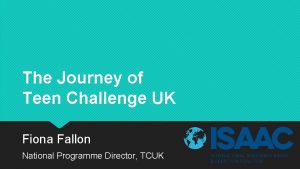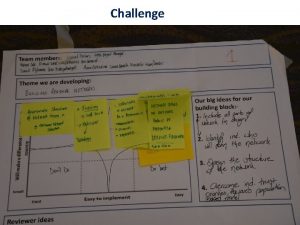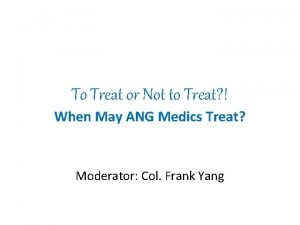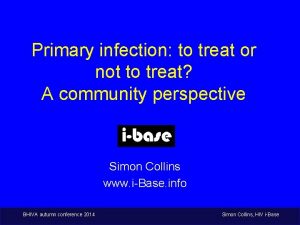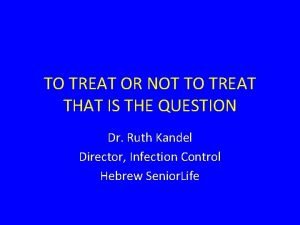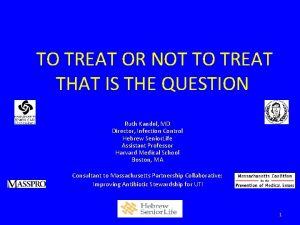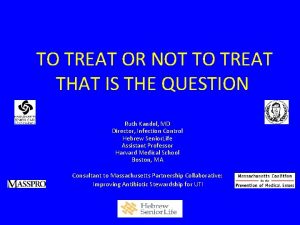To Treat or not to Treat the challenge

















- Slides: 17

To Treat or not to Treat: the challenge of a non-US citizen patient and oral anti-cancer treatment Stacy Longo Pharm. D Candidate WNE College of Pharmacy

Patient FM 57 y/o male with metastatic renal cell carcinoma (undocumented diagnosis date but reports was within the last 10 years) PMH HTN s/p right nephrectomy x 2 years Current medications Diovan 160 mg daily Votrient 800 mg daily (4 200 mg tablets) Zometa “monthly” Diclofenac “for pain”

Patient background 1 st visit: February 2016 Brazil native Came to the U. S. with documented records in Portuguese Metastatic RCC with metastatic lesion on right ninth lateral rib with additional lytic lesions in vertebral bodies T 6 and T 9 Imaged following ER visit for worsening pain on right chest

Patient background Treatment history reported at visit: sunitinib failure due to significant side effects pazopanib with some improvement but discontinuation x 6 months for “unknown reasons” Treatment plan: re-biopsy whole body bone scan CT of abdomen and pelvis

Patient background 2 nd visit: May 2016 Lost to follow up due to “emergency in Brazil” Patient reports diagnosis of new lesion on his back T 1 -T 2 while in Brazil and has copies of imaging films that supported this

Patient Background 3 rd visit: May 2016 PLAN: imaging and pathology confirmed metastatic RCC. Pazopanib will be started. Patient reported his doctor in Brazil instructed him to ask about PD-1 therapy now that is back in America Patient also reported he planned to stay for some time and does not plan to return to Brazil immediately

Votrient® (pazopanib) Drug Information

Votrient® (pazopanib) MOA: multitargeted tyrosine kinase inhibitor (MTKI) and VEGF inhibitor Indication: metastatic RCC Black Box Warning: hepatoxicity Monitor LFTs at baseline, weeks 3, 5, 7, 9 and at months 3 and 4, then periodically Common ADRs: HTN, fatigue, N/V/D, headache, electrolyte changes, anorexia, hair discoloration, hand-foot syndrome, elevated LFTs

COMPARZ Trial A phase 3, randomized 1: 1 trial comparing the efficacy and safety of pazopanib and sunitinib as first line therapy for metastatic RCC Primary endpoint – PFS Secondary endpoints – OS, safety, Qo. L Results PFS: pazopanib was noninferior to sunitinib OS: similar results Safety and Qo. L: sunitinib resulted in higher incidences of fatigue, hand-foot syndrome, and thrombocytopenia Motzer RJ et al. N Engl J Med. 2013; 369(8): 722 -731.

Where is FM now?

Oncology care access in Brazil Perspective

General Healthcare Access Brazil's universal healthcare system is called the Sistema Único de Saude (Unified Health System, SUS). When the country transitioned to a democratic government in 1988, healthcare remained the responsibility of the government and a human right as part of the Constitution. http: //www. cnn. com/2012/07/13/opinion/gomez-brazil-health-care/

Healthcare challenges Shortage of doctors and nurses Disparity in access between municipalities, with many of the rural poor still unable to readily access medical care Facilities and technology vastly differ between affluent cities and rural villages This has led to approximately 25% of the population to enroll in private health insurance plans http: //www. cnn. com/2012/07/13/opinion/gomez-brazil-health-care/

Cancer Treatment in Brazil http: //www. nature. com/news/brazilian-law-grants-patients-right-to-use-untestedcancer-drug-1. 19756 http: //www. sciencemag. org/news/2016/04/brazil-president-signs-law-legalizingrenegade-cancer-pill

Oral anti-cancer Agent Availability In 2013, Brazil’s Congress passed a law requiring all private health insurance companies to provide access to oral antineoplastic agents, including sunitinib and pazopanib. However, cost related to provider reimbursement and budget restrictions have kept angiogenesis inhibitors from being covered by SUS or stocked in national healthcare system hospitals https: //am. asco. org/how-action-civil-society-can-help-improve-access-cancermedications-case-study-brazil http: //www. pharmafile. com/news/172192/access-new-cancer-drugs-limitedbrazil-and-mexico

…Not to Treat. The oncologist responsible for FM’s care has decided to not continuing treating him while he is in Brazil.

References 1. Motzer RJ et al. Pazopanib versus sunitinib in metastatic renal-cell carcinoma. N Engl J Med. 2013; 369(8): 722 -731. 2. Gomez, EJ. In Brazil, health care is a right [Internet]. CNN; 2012 [cited 2016 Jun 13]. Available from: http: //www. cnn. com/2012/07/13/opinion/gomez-brazil-health-care/ 3. Ledford H. Brazilian law grants patients right to use untested cancer ‘drug’ [Internet]. Nature; 2016 [cited 2016 Jun 13]. Available from: http: //www. nature. com/news/brazilian-law-grants-patients-right-to-useuntested-cancer-drug-1. 19756 4. Escobar H. Brazil president signs law legalizing renegade cancer pill. Science; 2016 [cited 2016 Jun 13]. Available from: http: //www. sciencemag. org/news/2016/04/brazil-president-signs-lawlegalizing-renegade-cancer-pill 5. Lopes, G. How action by civil society can help improve access to cancer medications: a case study from Brazil. ASCO; 2016 [cited 2016 Jun 13]. Available from: https: //am. asco. org/how-action-civil-society-can-helpimprove-access-cancer-medications-case-study-brazil 6. Mc. Conaghie A. Access to new cancer drugs limited in Brazil and Mexico. Pharmafile. com; 2012 [cited 2016 Jun 13]. Available from: http: //www. pharmafile. com/news/172192/access-new-cancer-drugslimited-brazil-and-mexico
 How do we treat the life the life how we treat
How do we treat the life the life how we treat The eraser challenge urban dictionary
The eraser challenge urban dictionary Teen challenge nottingham
Teen challenge nottingham Uncontrolled, lacking in restraint
Uncontrolled, lacking in restraint Khi nào hổ mẹ dạy hổ con săn mồi
Khi nào hổ mẹ dạy hổ con săn mồi Thế nào là mạng điện lắp đặt kiểu nổi
Thế nào là mạng điện lắp đặt kiểu nổi Các châu lục và đại dương trên thế giới
Các châu lục và đại dương trên thế giới Dạng đột biến một nhiễm là
Dạng đột biến một nhiễm là Bổ thể
Bổ thể Nguyên nhân của sự mỏi cơ sinh 8
Nguyên nhân của sự mỏi cơ sinh 8 độ dài liên kết
độ dài liên kết Thiếu nhi thế giới liên hoan
Thiếu nhi thế giới liên hoan Tia chieu sa te
Tia chieu sa te Chúa yêu trần thế
Chúa yêu trần thế điện thế nghỉ
điện thế nghỉ Một số thể thơ truyền thống
Một số thể thơ truyền thống Trời xanh đây là của chúng ta thể thơ
Trời xanh đây là của chúng ta thể thơ Hệ hô hấp
Hệ hô hấp


